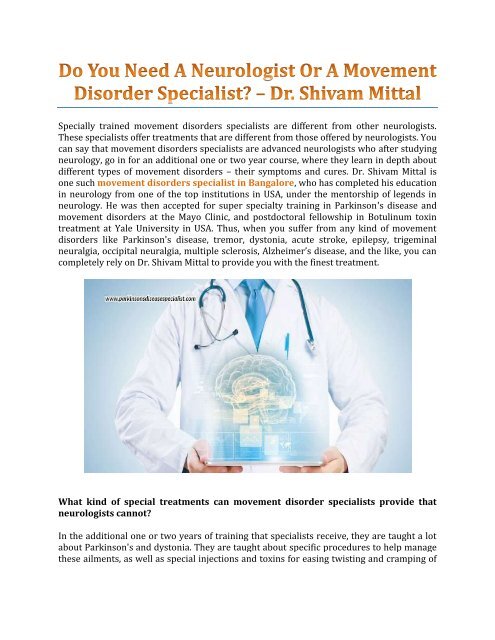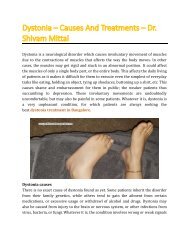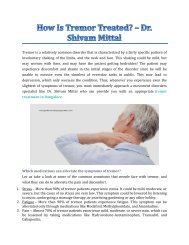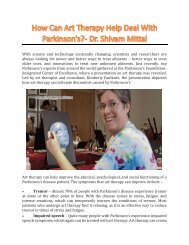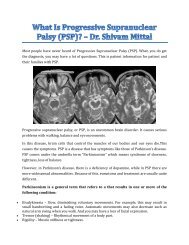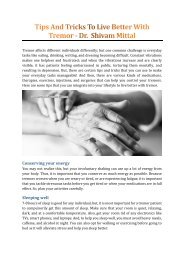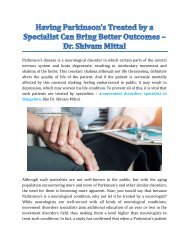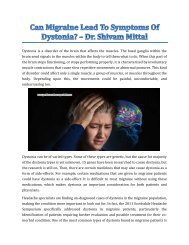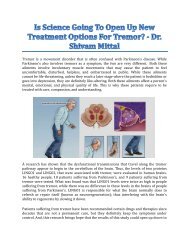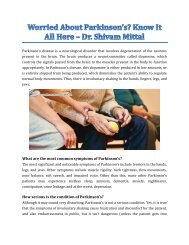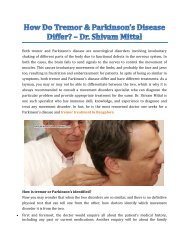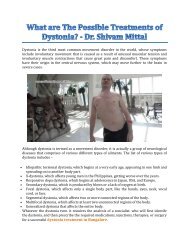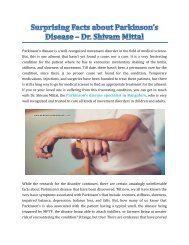Do You Need A Neurologist Or A Movement Disorder Specialist
Create successful ePaper yourself
Turn your PDF publications into a flip-book with our unique Google optimized e-Paper software.
Specially trained movement disorders specialists are different from other neurologists.<br />
These specialists offer treatments that are different from those offered by neurologists. <strong>You</strong><br />
can say that movement disorders specialists are advanced neurologists who after studying<br />
neurology, go in for an additional one or two year course, where they learn in depth about<br />
different types of movement disorders – their symptoms and cures. Dr. Shivam Mittal is<br />
one such movement disorders specialist in Bangalore, who has completed his education<br />
in neurology from one of the top institutions in USA, under the mentorship of legends in<br />
neurology. He was then accepted for super specialty training in Parkinson's disease and<br />
movement disorders at the Mayo Clinic, and postdoctoral fellowship in Botulinum toxin<br />
treatment at Yale University in USA. Thus, when you suffer from any kind of movement<br />
disorders like Parkinson's disease, tremor, dystonia, acute stroke, epilepsy, trigeminal<br />
neuralgia, occipital neuralgia, multiple sclerosis, Alzheimer’s disease, and the like, you can<br />
completely rely on Dr. Shivam Mittal to provide you with the finest treatment.<br />
What kind of special treatments can movement disorder specialists provide that<br />
neurologists cannot?<br />
In the additional one or two years of training that specialists receive, they are taught a lot<br />
about Parkinson's and dystonia. They are taught about specific procedures to help manage<br />
these ailments, as well as special injections and toxins for easing twisting and cramping of
ody parts. Furthermore, they are also trained for surgeries like Deep Brain Stimulation<br />
that help control the movement of nerves and muscles within the body.<br />
How are treatments tailored to heal different cases of movement disorders?<br />
Every movement disorder is different from the other. In fact, even the same movement<br />
disorder can result in different conditions and cases in different individuals. Thus, where<br />
general neurologists can help in treating movement disorders to only a basic extent,<br />
specialists can delve deeper into the matter. They analyze every aspect of the patient like<br />
age, gender, body type, health condition, symptoms, family health history, etc. before<br />
deciding upon the kind of treatment to offer to the patient. First, the condition is always<br />
preferred to be treated by medications and injections. But, if the condition of the patient is<br />
worse, only then surgeries are advised. Additionally, exercises and therapies are prescribed<br />
to ease the trouble caused by the movement disorder.<br />
Why and when do neurologists refer patients to a movement disorders specialist?<br />
Many people are unaware of the existence of specially trained movement disorders<br />
specialist, which is why the approach neurologists. These neurologists try to treat such<br />
patients as much as they can, but when patients need special treatments that they aren’t<br />
comfortable giving, they refer them to movement disorders specialists. This is because<br />
movement disorders patients, along with their neurological conditions, may also be<br />
experiencing urinary, psychiatric, cardiovascular, and gastrointestinal problems. Thus,<br />
figuring out a treatment that is right for this combination of symptoms can be tricky, which<br />
is something that a movement disorders specialist can better handle. So now, it is for you to<br />
decide whether you must opt for a neurologist or a movement disorders specialist in<br />
Bangalore.<br />
For more information, visit: http://parkinsonsdiseasespecialist.blogspot.com/


